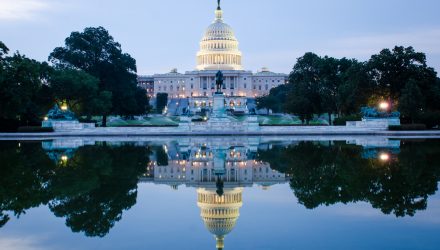Author: Kimberly D. Woody Senior Portfolio Manager
The Fed has, since spring 2022, raised the Federal Funds rate at an historically aggressive pace in order to curb inflation believed to be ignited by accommodative economic policy in response to the deleterious economic effects of the COVID-19 pandemic. Plainly, tightening monetary policy in an attempt to slow down an overheated economy by increasing interest rates. But did tighter monetary policy cool the economy? The results are not clear as evidenced by the last three hotter-than-expected CPI reports and especially the most recent on April 10. More importantly, did raising the interest rate at which banks and other depository institutions lend money to each other really tighten financial conditions?
While the Federal Reserve was attempting to tighten monetary conditions, the American Rescue Plan Act of 2021 simultaneously channeled $1.9 trillion dollars back into the economy.

The charts above suggest to us that money supply is in fact still elevated and likely funded by excessive amounts of debt relative to GDP. One only needs to reference 2008 to get a sense of the magnitude of the increase, and the economy then, unlike today, was experiencing serious structural turmoil. Today, we are stimulating into a surprisingly strong economy. What level of debt will be required to finance future stimulus in the event of economic weakness? And the U.S. is in no way alone in this. World debt in aggregate is rising even as central banks coordinate to quash inflation. Despite this, there seems to be no sense of fiscal responsibility emerging in Washington – in fact Washington is going the other way as we seem to recurrently bump up against the threat of government shutdowns related to budget overruns.
At the same time, over at the Fed, Chair Powell remains consistent in messaging on lowering rates three times this year, which many pundits think risks potentially further stoking inflation. Key measures of inflation such as rents, cars, and insurance are stubbornly sticky, with energy and other commodity prices also rising recently. The longer energy prices stay elevated, the more likely those increases will be passed on to the consumer. Real wages are being eroded while savings and delinquency rates reflect a diminishing level of consumer liquidity available to combat higher prices. It’s not a pretty picture but gives context to recent strong GDP prints and corporate earnings.
This explains the recent bid in precious metals, higher yields and strengthening dollar – the occurrence of which are not usually coincident. Bond vigilantes will manifest opinions in the long end of the curve, and rates may rise as higher returns will be required to compensate for purchasing government debt 20 years to maturity. Gold and other precious metal commodities are likely to benefit from risk off sentiment stemming from more persistent inflation. One inflation data point did not make a trend, but three are catching the market’s attention. Based simplistically on relative interest rate differentials and expected movements, the trade weighted dollar will likely remain strong as currencies around the world adjust to the new environment.
Or something will have to give. A meaningful effort to establish a culture of fiscal responsibility in Washington will go a long way towards improving investor sentiment in the short term and economic health on a longer-term horizon.
We believe our strategies are already well positioned for a more stubborn inflationary environment. Two of the best hedges are significant exposure to gold and companies running competitive businesses at the forefront of their industries that generate strong cash flow. Our strategies have both of these. We will continue to monitor our holdings in light of these considerations and make adjustments as necessary.
Source: FactSet
For more news, information, and analysis, visit the ETF Strategist Channel.
GLOBALT Investments LLC (“GLOBALT” or the “Firm”) was founded in 1990. It has been registered with the SEC as an Investment Adviser pursuant to the Investment Advisers Act of 1940 since 1991. Effective October 1, 2023, GLOBALT is a limited liability company owned by the employees and succeeding the “GLOBALT Investments” which had been a separately identifiable division of Synovus Trust Co. N.A. (its affiliate since 2002). GLOBALT is no longer affiliated with Synovus. As of November 6, 2023, GLOBALT’s successor registration was declared effective by the SEC, and reliance on the predecessor’s registration was no longer needed. The SEC declaring GLOBALT’s successor registration effective should not be mistaken for an endorsement.
This information has been prepared for educational purposes only, as general information and should not be considered a solicitation for the purchase or sale of any security. This does not constitute legal or professional advice and is not tailored to the investment needs of any specific investor. Registration of an investment adviser does not imply any certain level of skill or training. Due to rapidly changing market conditions and the complexity of investment decisions, supplemental information may be required to make informed investment decisions, based on your individual investment objectives and suitability specifications. Investors should seek tailored advice and should understand that statements regarding future prospects of the financial market may not be realized, as past performance does not guarantee and/or is not indicative of future results. Content may not be reproduced, distributed, or transmitted in whole or in part by any means without written permission from GLOBALT. Regarding permission, as well as to receive a copy of GLOBALT’s Form ADV Part 2 and Part 3, contact GLOBALT’s Chief Compliance Officer, 3200 Windy Hill Road SE, Suite 1550E, Atlanta GA 30339. You can obtain more information about GLOBALT Investments and its advisers via the Internet at adviserinfo.sec.gov, sponsored by the U.S. Securities and Exchange Commission.

